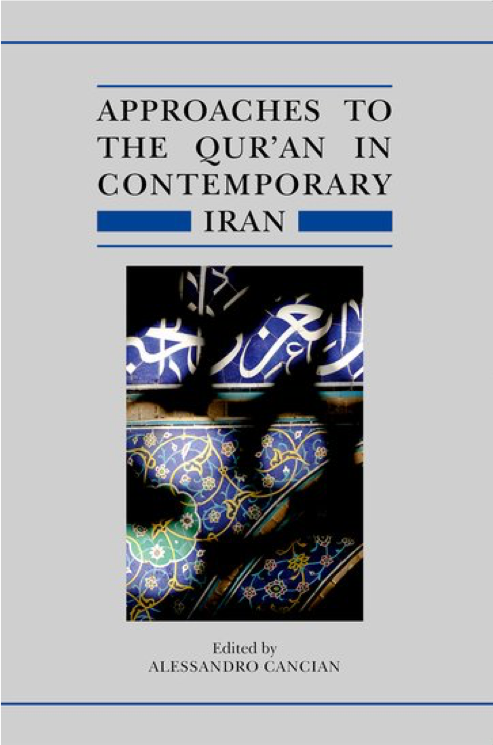Oxford University Press, in association with the Institute of Ismaili Studies, has recently published a new volume in its Qur’anic Studies Series, Approaches to the Qur’an in Contemporary Iran, edited by Alessandro Cancian (Senior Research Associate at the Institute of Ismaili Studies).
The volume is composed of seventeen chapters that touch upon different aspects of the impact, understanding and use of the Qur’an in contemporary Iran. It covers the last two centuries of reflection on revelation and scripture in the Persian-speaking world. The collection is meant to provide academics working in the fields of the intellectual and religious history of early modern and modern Iran, as well as in Qur’anic Studies, with a comprehensive overview of the richness and plurality of Iran’s engagement with the Qur’an. It achieves this by bringing together different approaches from theology, mysticism, exegesis, reformism, cinema, music, and visual and popular culture.
Lloyd Ridgeon, Reader in Islamic Studies at the University of Glasgow, gave the following review of the volume:
This essential work, composed of chapters authored by some of the world’s leading academics in Islamic and Iranian studies, provides a comprehensive analysis of how the Qur’an is received in modern Iran. The collection’s range of topics has been carefully considered, shedding light on modern hermeneutical problems, mystical ways of perceiving the sacred text, and its significance in modern cultural forms including cinema and music, among others. The chapters have been researched with meticulous care to detail. Approaches to the Qur’an in Contemporary Iran looks set to become a classic work.
For more information on the contributions to this volume, see the table of contents below:
Introduction: Alessandro Cancian
Section I: Power, Authority and Exegesis
1 Rational-analytical Tafsīr in Modern Iran: The Influence of the Uṣūlī School of Jurisprudence on the Interpretation of the Qur’an 19
Seyfeddin Kara
2 Striving Beyond the Balance (al-Mīzān): Spiritual Practice and the Qur’an in the Ṭabāṭabāʾī Ṭarīqa 41
Sajjad Rizvi
3 Privileging the Qur’an: Divorce and the Hermeneutics of Yūsuf Ṣāniʿī 77
Liyakat Takim
4 Al-Amr bi’l-maʿrūf and the Semiotics of Sovereignty in Contemporary Iran 101
Neguin Yavari
5 The Limits of a ‘Fixed’ Qur’an: The Iranian Religious Intellectual Movement beyond the Historical Methods 123
Banafsheh Madaninejad
6 Soroush’s Theory of Qur’anic Revelation: A Historical-Philosophical Appraisal 149
Yaser Mirdamadi
Section II: Alternative Approaches: Between Marginality and Legitimacy
7 A Sufi Defence of the Qur’an: Ḥusayn ʿAlī Shāh’s Rebuttal of Henry Martyn 185
Reza Tabandeh
8 Abrogation and Falsification of Scripture according to Shi‘i Authors in Iraq and Iran (19th–20th Centuries) 225
Rainer Brunner
9 Speaking the Secrets of Sanctity in the Tafsīr of Ṣafī ʿAlī Shāh 243
Nicholas Boylston
10 Exegesis and the Place of Sufism in Nineteenth-Century Twelver Shi‘ism: Sulṭān ʿAlī Shāh Gunābādīand his Bayān al-saʿāda 271
Alessandro Cancian
11 In the Company of the Qur’an by Muḥyī al-Dīn Ilāhī Ghomshei 291
Leonard Lewisohn
Section III: The Arts, Material Culture and Everyday Life
12 A Contemporary Illustrated Qur’an: Zenderoudi’s Illustrations of Grosjean’s Translation (1972) 325
Alice Bombardier
13 Women, the Qur’an and the Power of Calligraphy in Contemporary Iran 353
Anna Vanzan
14 The Divine Word on the Screen: Imaging the Qur’an in Iranian Cinema 375
Nacim Pak-Shiraz
15 Notes on Ritual Prayer in Iran: Qunūt Choices among a Group of Shi‘i Women 409
Niloofar Haeri
16 Twelver Shi‘i Women’s Appropriation of the Qur’an in Contemporary Iran 421
Ingvild Flaskerud
17 The Qur’an as an Aesthetical Model in Music? The Case of Muḥammad Riḍā Shajariyān between the Qur’an and radīf 445
Giovanni De Zorzi
Want to read more? Buy this book online.
Text accessed and reproduced with the kind permission of Alessandro Cancian.
© International Qur’anic Studies Association, 2019. All rights reserved.
